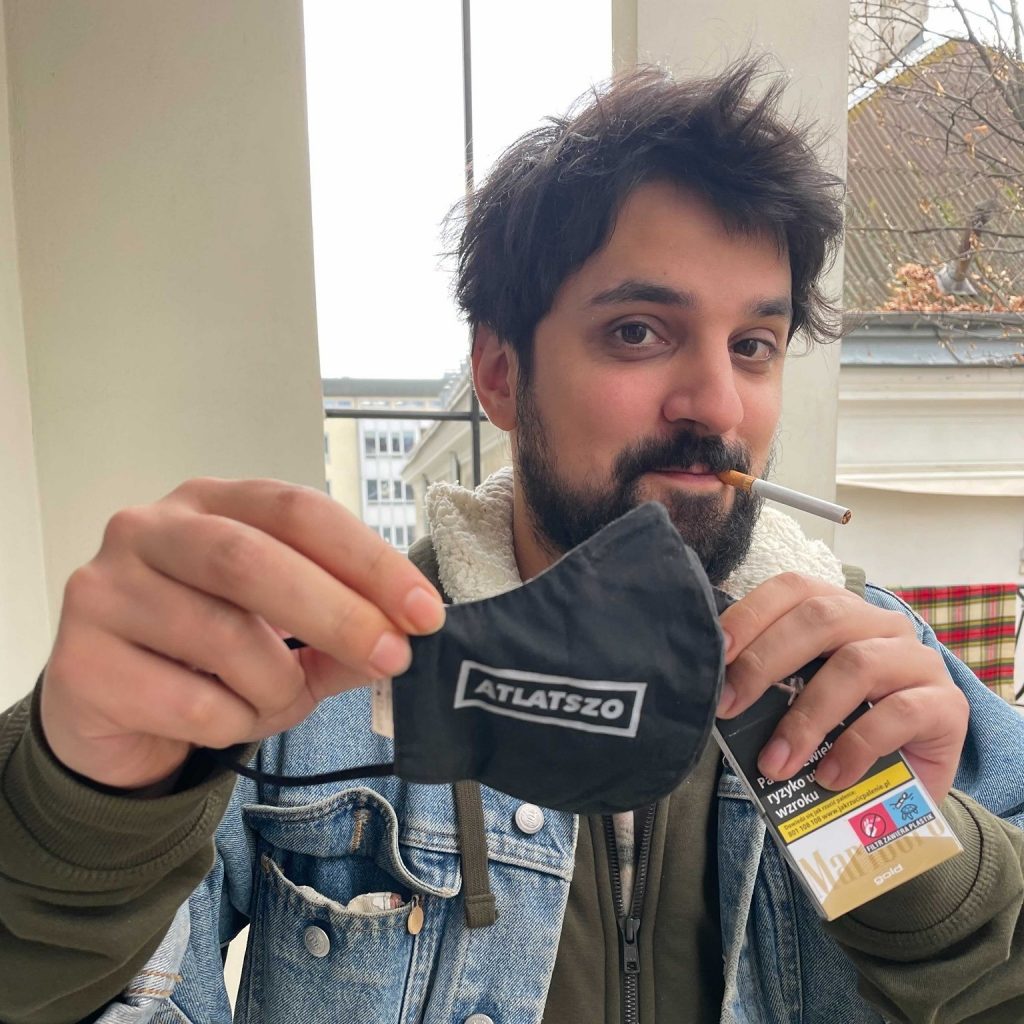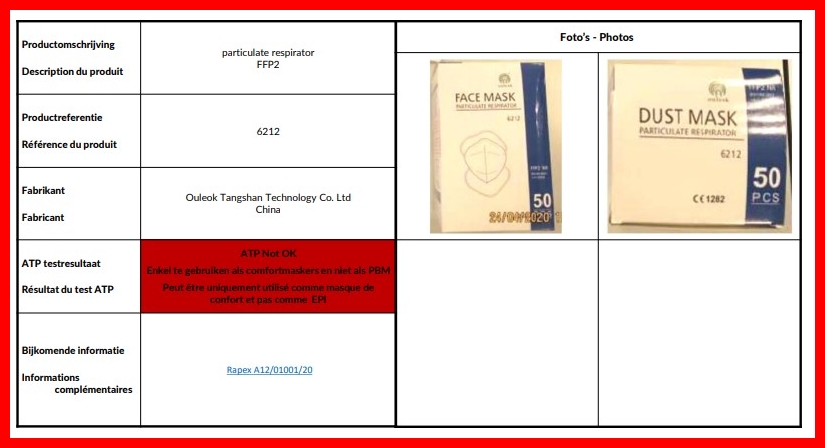The https://english.atlatszo.hu use cookies to track and profile customers such as action tags and pixel tracking on our website to assist our marketing. On our website we use technical, analytical, marketing and preference cookies. These are necessary for our site to work properly and to give us inforamation about how our site is used. See Cookies Policy
In spite of EU-wide alert, Hungarian gov’t contracted to purchase millions of faulty masks
Various government institutions worldwide experienced problems with masks sold as FFP2 made by a certain Chinese producer, but the Hungarian government has contracted to purchase possibly more than 7 million pieces of the same product to hand out to doctors, medical workers, members of the police and the military. The trading company received altogether 38,5 million USD for Covid-related supplies from the Hungarian government: now they say they didn’t supply the faulty type mask in the end.

„The product bears a CE marking but is not certified as protective equipment by a relevant body. Additionally, the particle/filter retention of the material is insufficient (measured value ≤ 81.8 %) and the mask does not properly adapt to the face. Consequently, an excessive amount of particles or microorganisms might pass through the mask, increasing the risk of infection if not combined with additional protective measures. The product does not comply with the Personal Protective Equipment Regulation.” — reads an alert on the website of Rapex, the EU rapid alert system for dangerous non-food products for a face mask manufactured by Ouleok (Tangshan) Technology Co. Ltd.
The type was assessed as problematic by Belgian authorities in April 2020. In the same month, the Hungarian foreign ministry, led by Fidesz politician Péter Szijjártó has contracted a Hungary-registered company to buy masks sourced from the same producer.
The contract was modified several times, but the last known version still included this detail. According to this, Ouleok was one of three manufacturers from whose products 7.8 million was to be purchased by the ministry. We don’t know the exact breakdown of the products supplied. The price of one piece was set at 1.6 USD, not including VAT and customs.
According to the contract, Szijjártó’ ministry was told that the documentation of some of the masks might not be totally in order.
As the contract specified a June 2020 deadline, we could assume that the supplies arrived in Hungary during last summer and were handed out to people in the frontline of the fight against Covid-19: doctors, medical workers, members of the police and the military. After our story was published in Hungarian, the ministry has said that eventually they received zero items originating from the producer in question.
Health Canada has included the type in its list consisting of face masks that that do not meet performance standards, based on the testing conducted by the US federal agency National Institute of Occupational Safety and Health. A member state of Germany, Baden-Württemberg also had the types checked out, with the result being: its „permeability is well above the norm values”. The state leadership which originally purchased the masks have since asked various institutions not to use the problematic types, including this one.

Baden-Württemberg test results for the Ouleok masks Source: historian Matthias Kramer’s blog
We don’t know of any single event in which the Hungarian government have admitted that they bought nonperfect products and informed the end users to use them with caution. Neither do we know of the any effort by Hungarian government to reclaim any compensation for problematic products, something Baden-Württemberg now pursues.
The trader contracted to supply the equipment is Hungary-registered Gyömrői-Sarok Projekt Kft., which — by way of several contracts that were modified severatl times — was to supply 86 million pieces of gloves and 28.9 million pieces of face masks. The total supplied in the end was less than this: the ministry has informed István Ujhelyi socialist politician that they bought altogether 108.9 million pieces of ’other protective equipment’ from Gyömrői-Sarok.
These contracts became public after Hírklikk reporter Zoltán Bogád filed a public freedom of information request via the Kimittud FOI request generator service provided by Átlátszó. According to the foreign ministry’s list of contracts published on the government website, the government paid altogether 38.495 million USD to Gyömrői-Sarok for Covid-related supplies.
The owner of Gyömrői-Sarok is Vietnamese-born Vu Quy Duong, who held interests in about a hundred tobacco shops around Hungary in 2018. After Viktor Orbán’s Fidesz party effectively nationalised and then reprivatised the trade of tobacco products in 2012, reports and leaks unearthed what seemed to be a by design corrupt system, in which businessmen supporting Fidesz were awarded tobacco shop licenses.
Átlátszó has formerly reported that Vu belonged to the same golf club as a Fidesz MP at the time. Known affectionately by his Hungarian nickname, „Zoli” Vu is cherished in the Hungarian Vietnamese community as a „young, positive” business leader, who employs many of his fellow Vietnamese in his Sárkány Center shopping mall.
However, the responsibility for purchasing the masks does not stop at Zoli Vu. Especially so, since the contract specified that „EU quality assessment of the products by notified bodies did not necessarily happen. Parties agree that owing to the emergency at hand, there is no time for certification of products in all of the cases and necessary EU certificates are not available for all products, which is known to Buyer and it belongs in its purview to decide to order the equipment in the knowledge of these circumstances”.
Átlátszó has contacted the ministry, the seller and the government institution responsible for handing out such equipment several days before publication. One of the things we asked all of them was to tell us how many items were supplied in the end. Before publication, we didn’t receive any answer.
Only after Átlátszó’s story was published in Hungarian did the ministry send a press release to some media, not including Átlátszó. We do not know this release in its original form, but according to some reports, it seems to claim that in the end, no Ouleok masks were supplied to Hungary.
We’ve also received an answer from the trading company owner. In this email, Vu claimed that eventually they didn’t supply the type. This is possible, as the exact breakdown of the supplies wasn’t specified in the contract. However, we cannot verify their claim from any other source, as the Hungarian government does not publish this sort of information anywhere. So far, Vu didn’t answer our request to provide Átlátszó with documentary evidence.
It also remains unclear why the ministry had contracted for the purchase of masks made by Ouleok, if they weren’t included in actual deliveries.
Healthcare workers usually don’t know what type of masks they are wearing. A state-employed medical worker, asking for anonimity because of the countrywide ban on them talking to the media, told Átlátszó that at the institution this person works at, they never see the original packaging of protective equipment. Boxes are opened by warehouse workers, who feed masks (sometimes without any packaging) into vending machines, which can only then be accessed by medical workers, this person told Átlátszó.
Translation: Márton Sarkadi Nagy. Original Hungarian story: Márton Sarkadi Nagy
Cover photo: information on Ouleok’s mask in the publication of Belgian government agency FAMHP

Share:
Your support matters. Your donation helps us to uncover the truth.
- PayPal
- Bank transfer
- Patreon
- Benevity
Support our work with a PayPal donation to the Átlátszónet Foundation! Thank you.
Support our work by bank transfer to the account of the Átlátszónet Foundation. Please add in the comments: “Donation”
Beneficiary: Átlátszónet Alapítvány, bank name and address: Raiffeisen Bank, H-1054 Budapest, Akadémia utca 6.
EUR: IBAN HU36 1201 1265 0142 5189 0040 0002
USD: IBAN HU36 1201 1265 0142 5189 0050 0009
HUF: IBAN HU78 1201 1265 0142 5189 0030 0005
SWIFT: UBRTHUHB
Be a follower on Patreon
Support us on Benevity!


